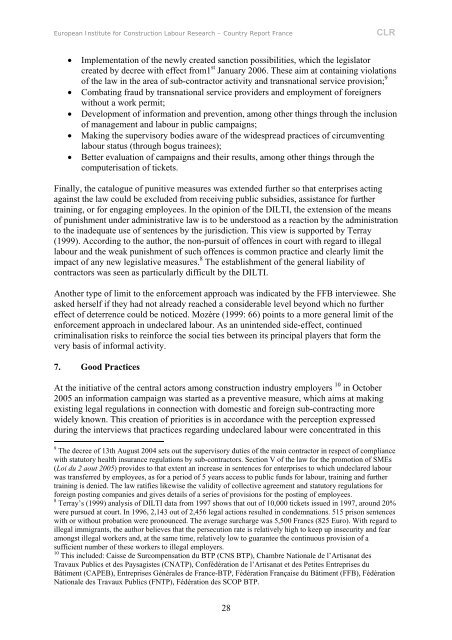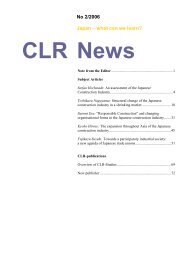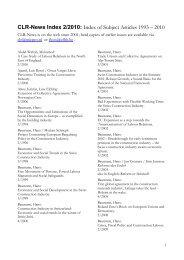Country report France - Construction Labour Research
Country report France - Construction Labour Research
Country report France - Construction Labour Research
Create successful ePaper yourself
Turn your PDF publications into a flip-book with our unique Google optimized e-Paper software.
European Institute for <strong>Construction</strong> <strong>Labour</strong> <strong>Research</strong> – <strong>Country</strong> Report <strong>France</strong>CLR• Implementation of the newly created sanction possibilities, which the legislatorcreated by decree with effect from1 st January 2006. These aim at containing violationsof the law in the area of sub-contractor activity and transnational service provision; 9• Combating fraud by transnational service providers and employment of foreignerswithout a work permit;• Development of information and prevention, among other things through the inclusionof management and labour in public campaigns;• Making the supervisory bodies aware of the widespread practices of circumventinglabour status (through bogus trainees);• Better evaluation of campaigns and their results, among other things through thecomputerisation of tickets.Finally, the catalogue of punitive measures was extended further so that enterprises actingagainst the law could be excluded from receiving public subsidies, assistance for furthertraining, or for engaging employees. In the opinion of the DILTI, the extension of the meansof punishment under administrative law is to be understood as a reaction by the administrationto the inadequate use of sentences by the jurisdiction. This view is supported by Terray(1999). According to the author, the non-pursuit of offences in court with regard to illegallabour and the weak punishment of such offences is common practice and clearly limit theimpact of any new legislative measures. 8 The establishment of the general liability ofcontractors was seen as particularly difficult by the DILTI.Another type of limit to the enforcement approach was indicated by the FFB interviewee. Sheasked herself if they had not already reached a considerable level beyond which no furthereffect of deterrence could be noticed. Mozère (1999: 66) points to a more general limit of theenforcement approach in undeclared labour. As an unintended side-effect, continuedcriminalisation risks to reinforce the social ties between its principal players that form thevery basis of informal activity.7. Good PracticesAt the initiative of the central actors among construction industry employers 10 in October2005 an information campaign was started as a preventive measure, which aims at makingexisting legal regulations in connection with domestic and foreign sub-contracting morewidely known. This creation of priorities is in accordance with the perception expressedduring the interviews that practices regarding undeclared labour were concentrated in this9 The decree of 13th August 2004 sets out the supervisory duties of the main contractor in respect of compliancewith statutory health insurance regulations by sub-contractors. Section V of the law for the promotion of SMEs(Loi du 2 aout 2005) provides to that extent an increase in sentences for enterprises to which undeclared labourwas transferred by employees, as for a period of 5 years access to public funds for labour, training and furthertraining is denied. The law ratifies likewise the validity of collective agreement and statutory regulations forforeign posting companies and gives details of a series of provisions for the posting of employees.8 Terray’s (1999) analysis of DILTI data from 1997 shows that out of 10,000 tickets issued in 1997, around 20%were pursued at court. In 1996, 2,143 out of 2,456 legal actions resulted in condemnations. 515 prison sentenceswith or without probation were pronounced. The average surcharge was 5,500 Francs (825 Euro). With regard toillegal immigrants, the author believes that the persecution rate is relatively high to keep up insecurity and fearamongst illegal workers and, at the same time, relatively low to guarantee the continuous provision of asufficient number of these workers to illegal employers.10 This included: Caisse de Surcompensation du BTP (CNS BTP), Chambre Nationale de l’Artisanat desTravaux Publics et des Paysagistes (CNATP), Confédération de l’Artisanat et des Petites Entreprises duBâtiment (CAPEB), Entreprises Générales de <strong>France</strong>-BTP, Fédération Française du Bâtiment (FFB), FédérationNationale des Travaux Publics (FNTP), Fédération des SCOP BTP.28









